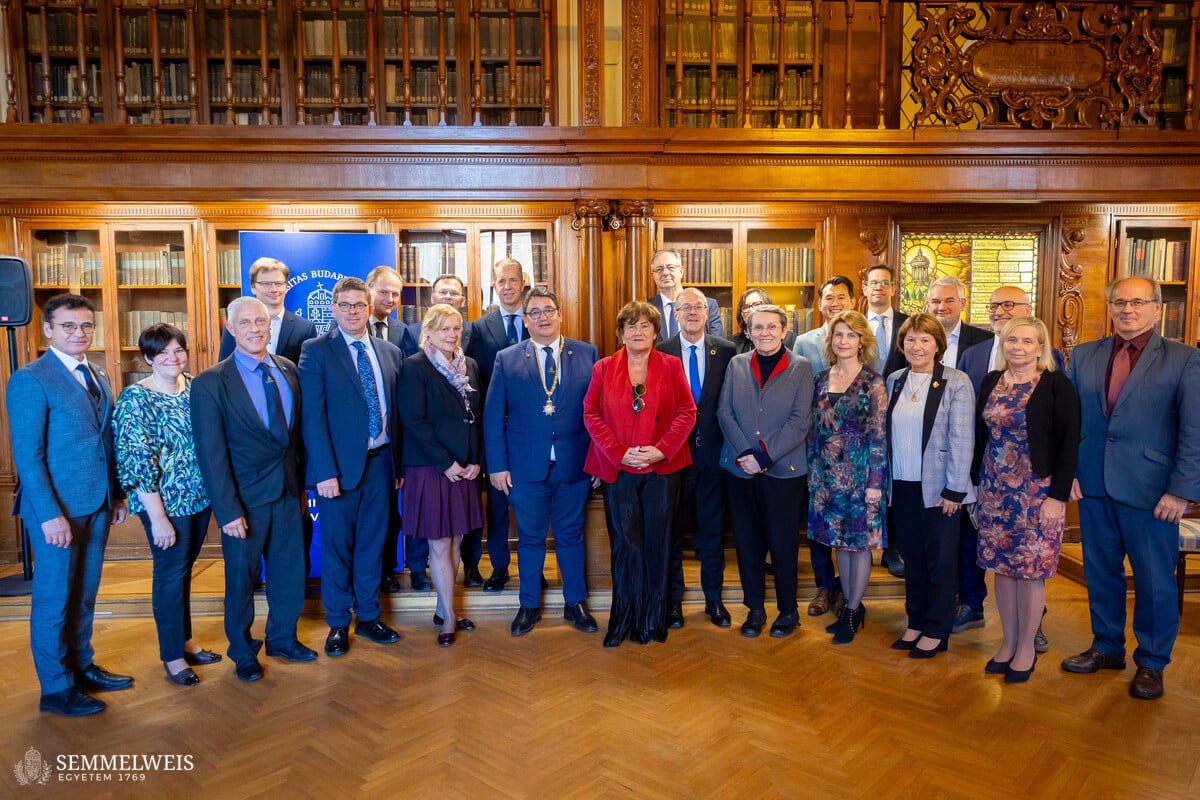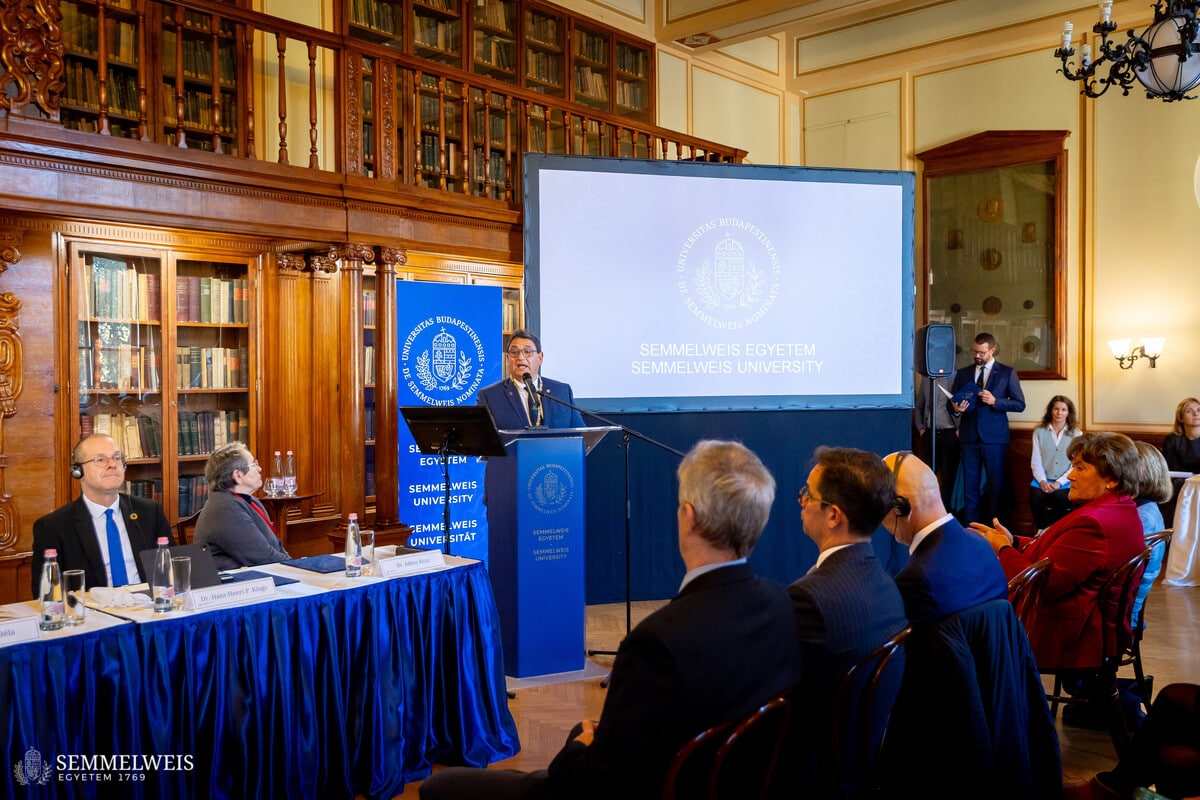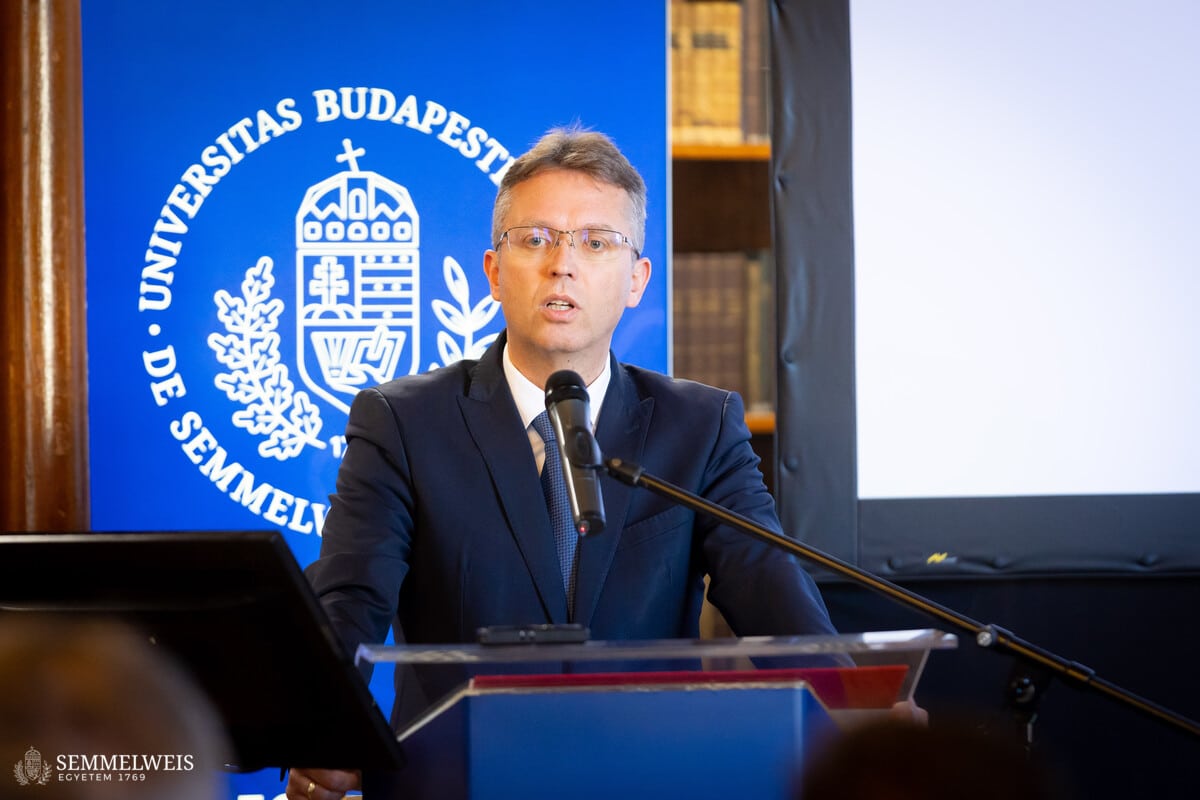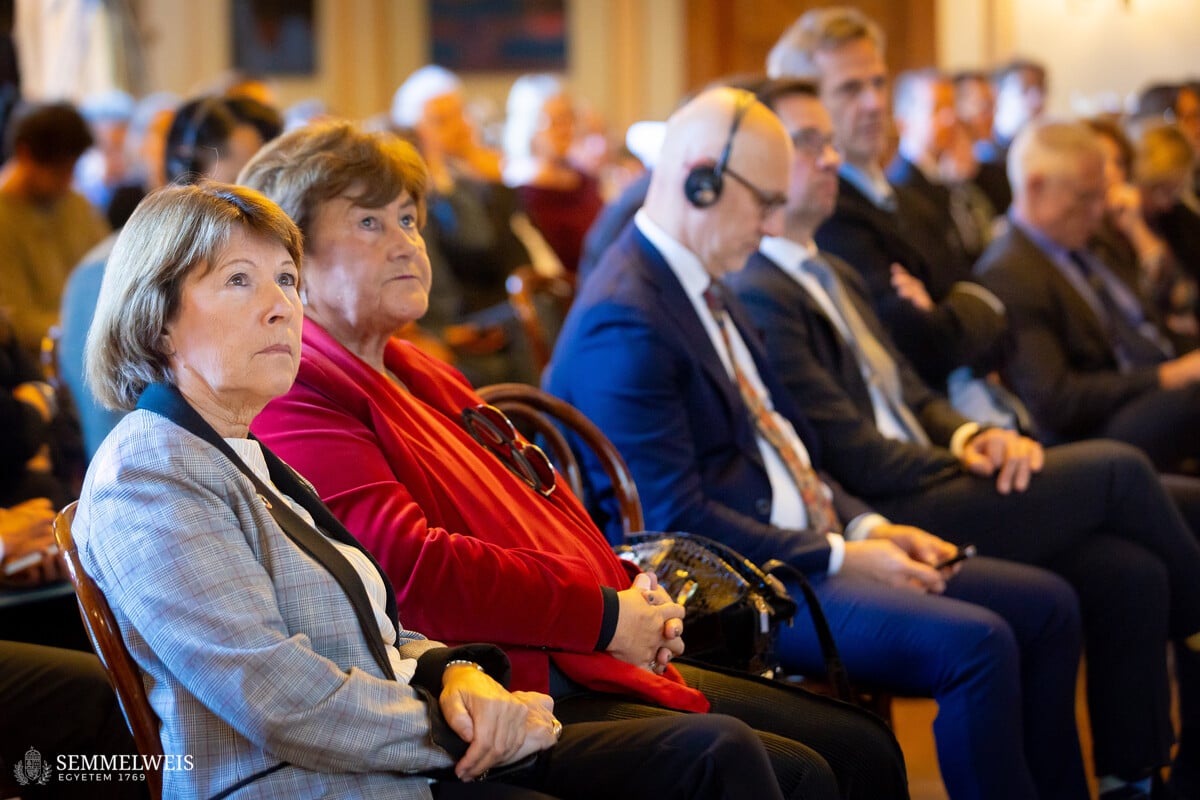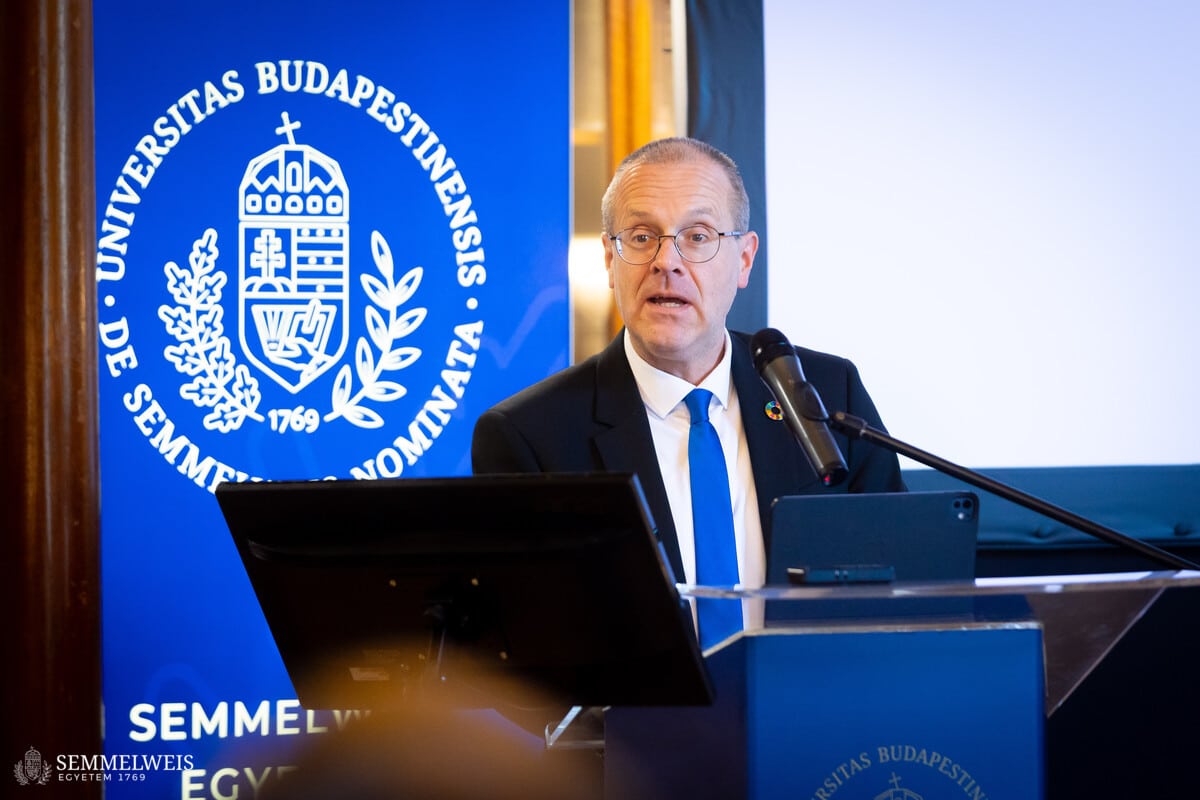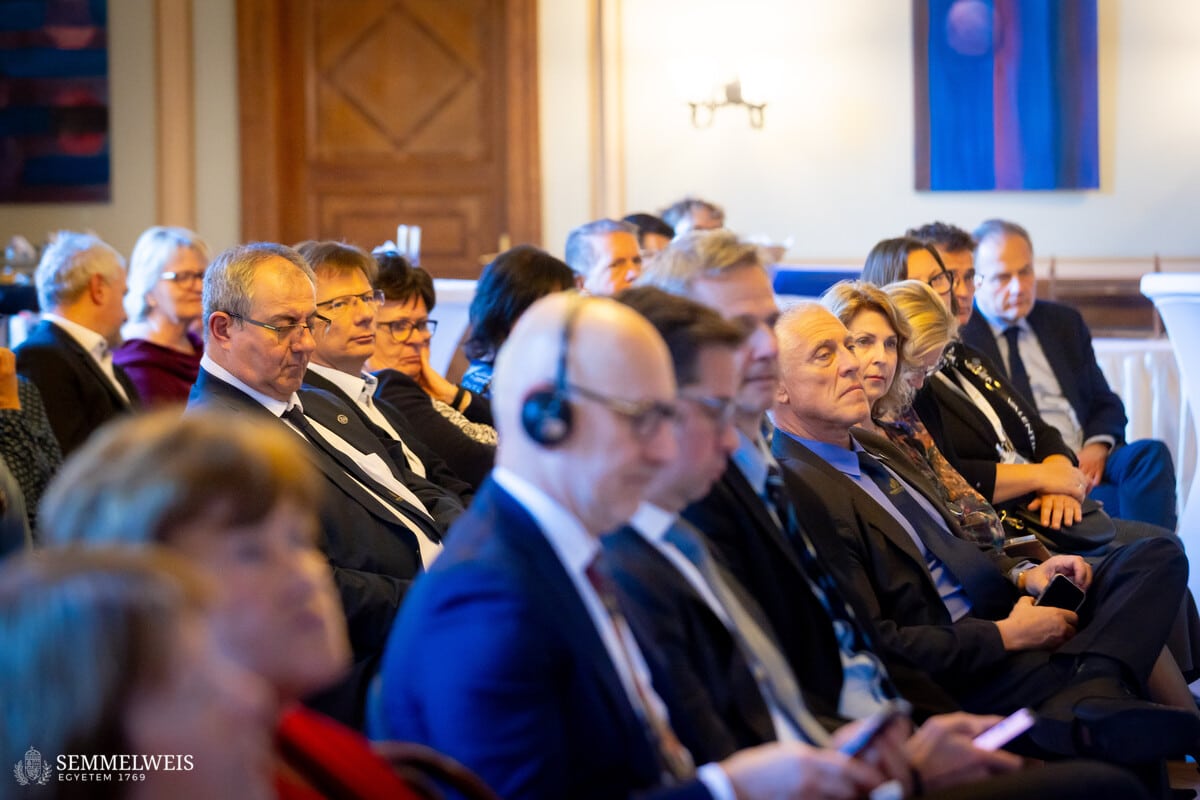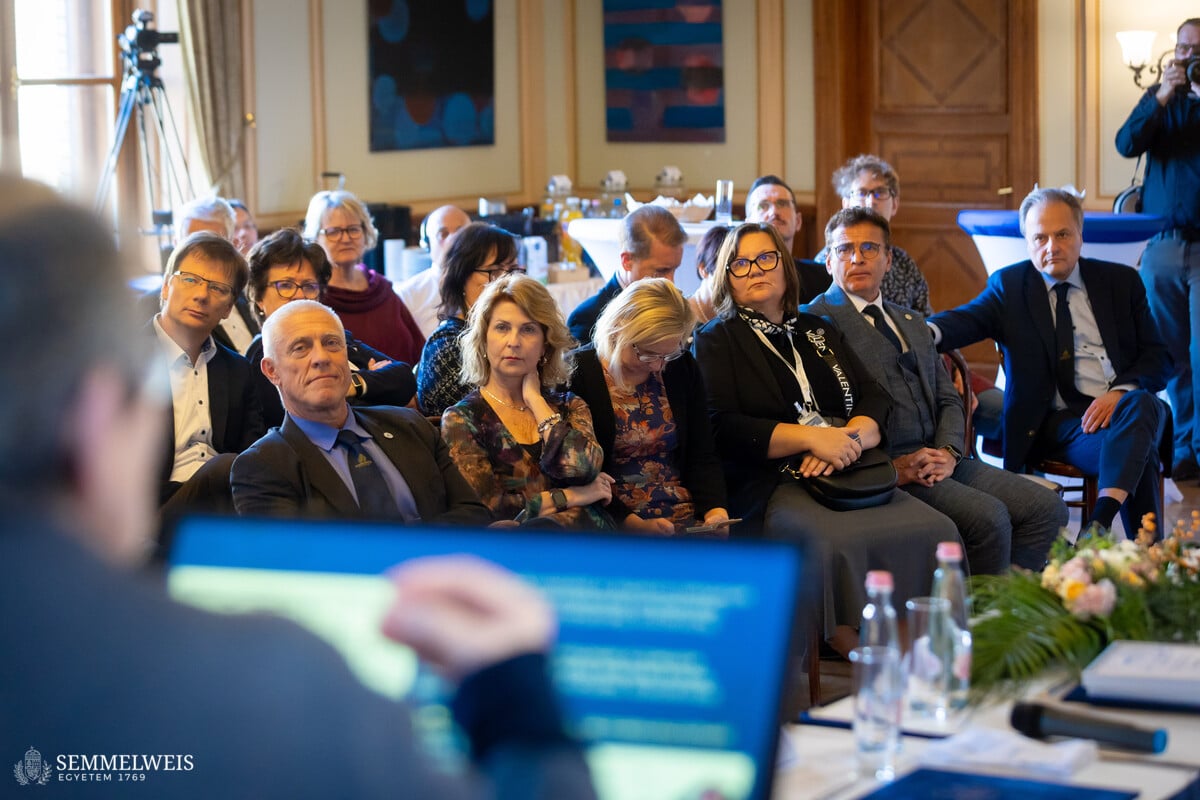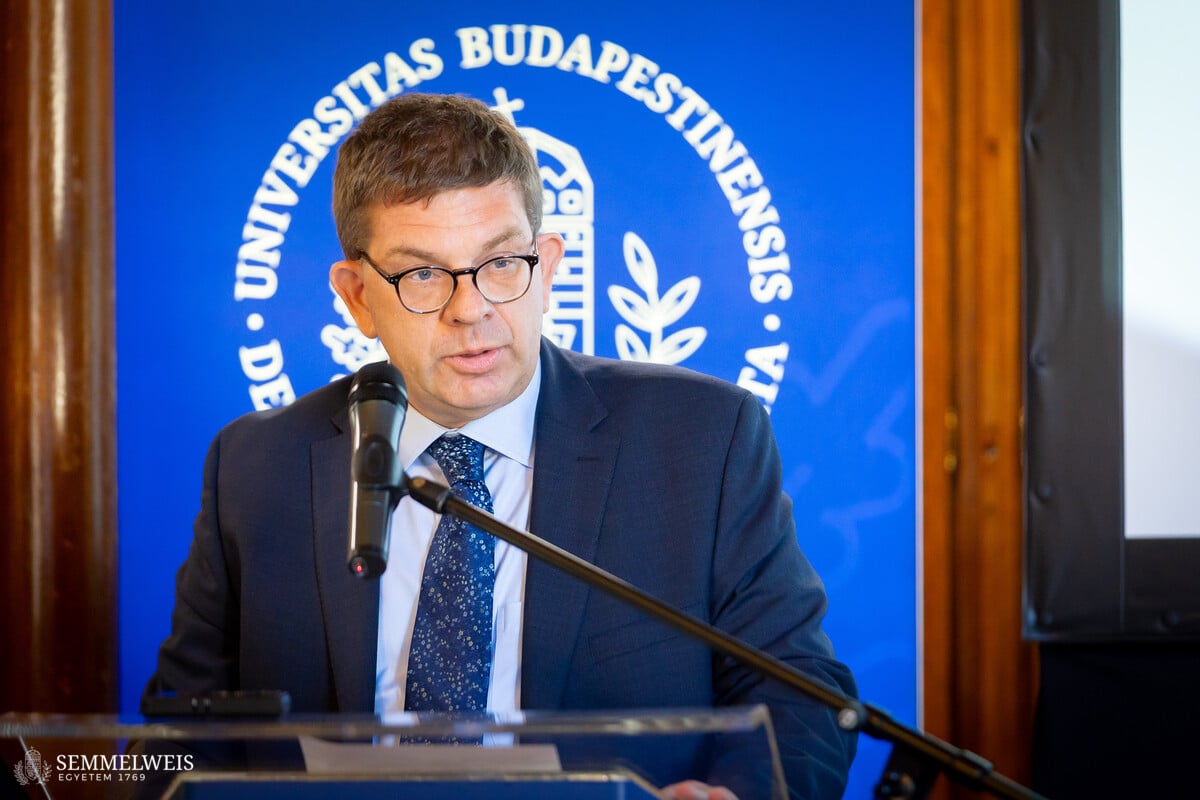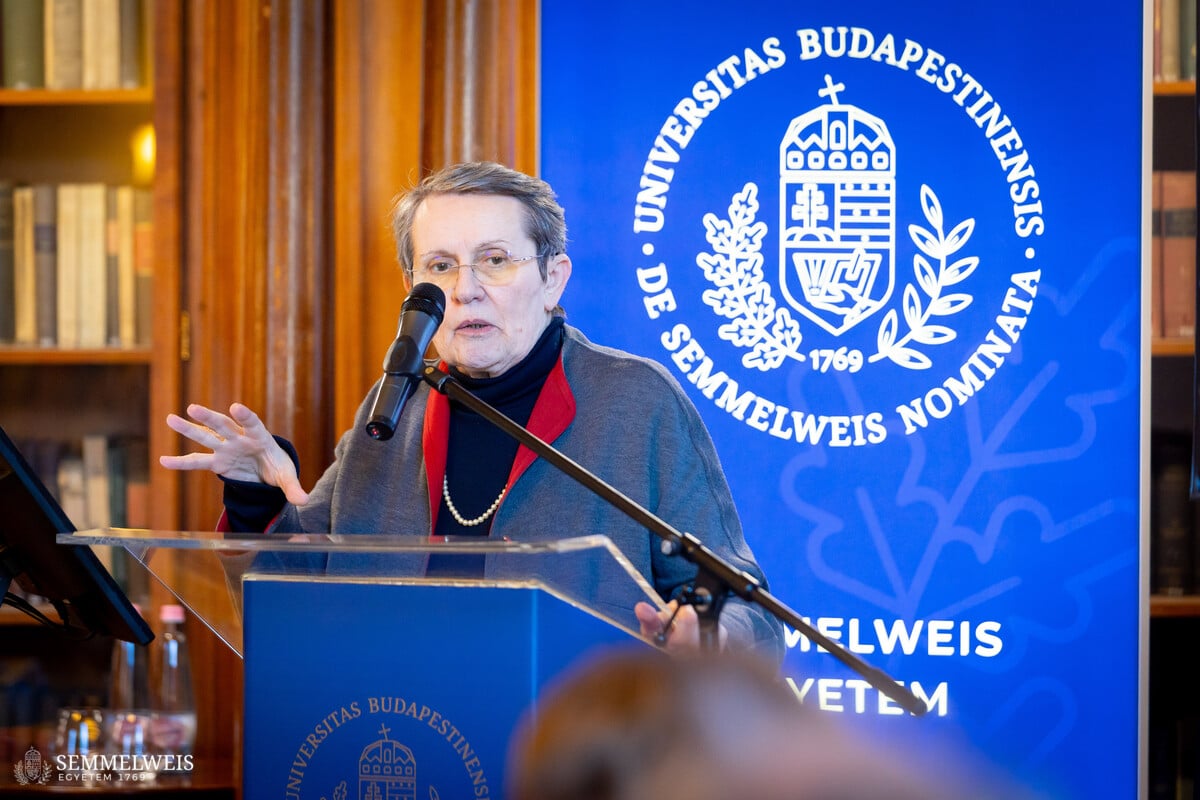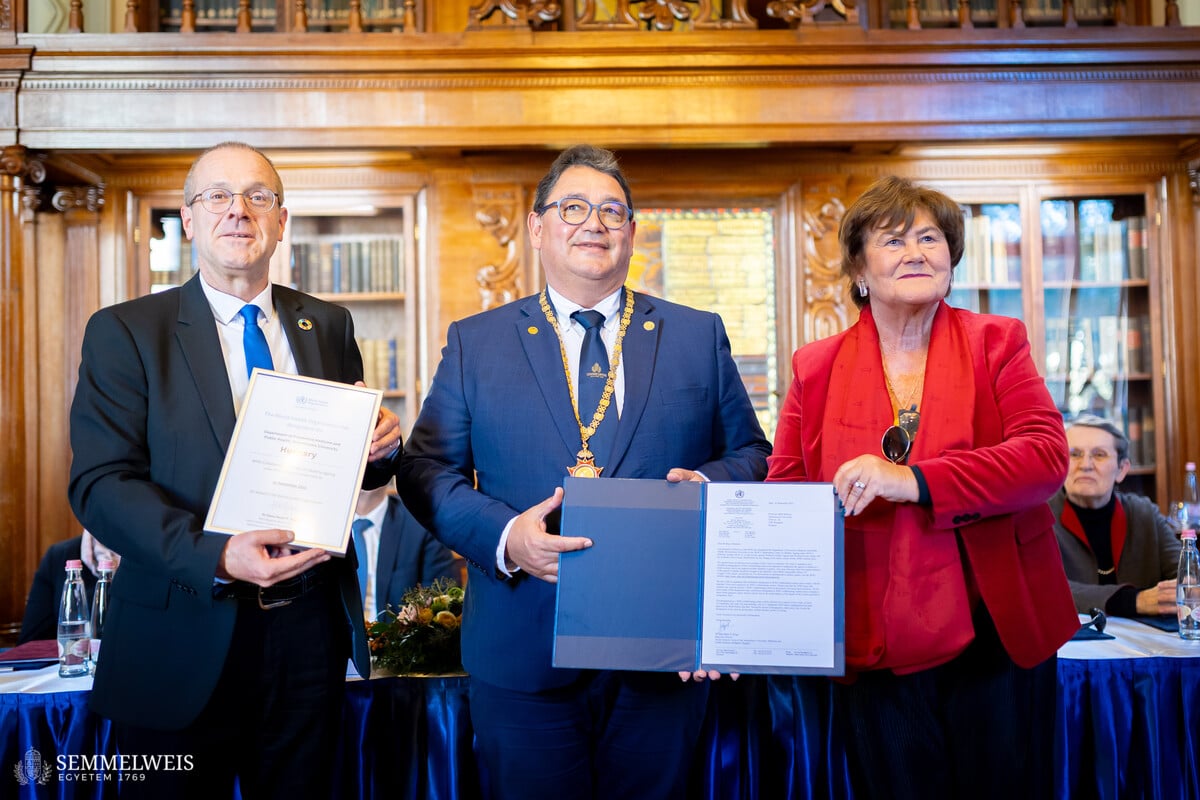
“Healthy aging is not only about extending life expectancy, but also about increasing the number of years spent in good health. This is what the WHO and our university’s Institute of Preventive Medicine and Public Health are working on, and I am delighted that today we are further strengthening our cooperation,” pointed out Dr. Béla Merkely, Rector of Semmelweis University, on the occasion of the World Health Organization (WHO) declaring the university’s Institute of Preventive Medicine and Public Health a WHO Collaborating Centre for Healthy Ageing. The institute was awarded this title on September 22, 2025, in recognition of its outstanding scientific, educational, and expert activities in the field of public health. On November 4, 2025, Dr. Béla Merkely received the official certificate of validation from Dr. Hans Henri P. Kluge, WHO Regional Director for Europe and winner of Semmelweis University’s Doctor Honoris Causa award.
 In his opening remarks, the rector emphasized that Semmelweis University, the leading medical and health sciences university in Hungary and the region, considered its primary mission to enhance the health of citizens, to which it contributed through high-level training, research, patient care, and expert activities. He stressed the importance of providing the public with reliable information, and of fostering a prevention-focused approach in medical training, in which students are involved during their studies. He also mentioned that, as part of the Family-Friendly University Program, the institution contributed to the physical and mental health of students and staff through a wide range of preventive services. In his words, the Institute of Preventive Medicine and Public Health has long been working to increase the number of years citizens spend in good health, and the university is also implementing its Healthy Aging Program on the initiative of Professor Dr. Róza Ádány. “We consider our longitudinal occupational health promotion and disease prevention program, the Semmelweis Study, to be a priority project, the long-term goal of which is to identify and examine factors influencing healthy aging over a period of 20 years,” said Dr. Béla Merkely. He added that the university also placed great emphasis on screening and awareness raising programs that support public health.
In his opening remarks, the rector emphasized that Semmelweis University, the leading medical and health sciences university in Hungary and the region, considered its primary mission to enhance the health of citizens, to which it contributed through high-level training, research, patient care, and expert activities. He stressed the importance of providing the public with reliable information, and of fostering a prevention-focused approach in medical training, in which students are involved during their studies. He also mentioned that, as part of the Family-Friendly University Program, the institution contributed to the physical and mental health of students and staff through a wide range of preventive services. In his words, the Institute of Preventive Medicine and Public Health has long been working to increase the number of years citizens spend in good health, and the university is also implementing its Healthy Aging Program on the initiative of Professor Dr. Róza Ádány. “We consider our longitudinal occupational health promotion and disease prevention program, the Semmelweis Study, to be a priority project, the long-term goal of which is to identify and examine factors influencing healthy aging over a period of 20 years,” said Dr. Béla Merkely. He added that the university also placed great emphasis on screening and awareness raising programs that support public health.
It is a great honor that our institute has been recognized by the World Health Organization as a WHO Collaborating Centre for Healthy Ageing. I am confident that with the help of the center, healthy aging will become accessible to as many people as possible. – Dr. Béla Merkely
 “We Hungarians owe respect to our elderly citizens, and the Hungarian budget allocates an amount even greater than healthcare spending, HUF 7,700 billion, to preserving their financial security,” said Dr. Balázs Hankó, Minister of Culture and Innovation. He added that although the effectiveness of Hungarian healthcare is on par with that of Western countries, there is still work to be done in terms of increasing the number of years spent in good health. “That is why I consider this cooperation between the WHO and Semmelweis University to be so remarkable, as healthy aging and dignified old age demonstrate the strength of a nation,” highlighted the minister. He also emphasized that Semmelweis University, as Hungary’s largest education center for medical and health sciences and its largest and most comprehensive healthcare provider, ranked among the top one percent of the world’s 30,000 universities in terms of performance. He acknowledged that Semmelweis University served the threefold mission of healthcare, education, and research every day as part of the renewed Hungarian higher education system, and that closer cooperation with the WHO would also contribute to its goal of becoming one of the world’s 100 best universities by 2030.
“We Hungarians owe respect to our elderly citizens, and the Hungarian budget allocates an amount even greater than healthcare spending, HUF 7,700 billion, to preserving their financial security,” said Dr. Balázs Hankó, Minister of Culture and Innovation. He added that although the effectiveness of Hungarian healthcare is on par with that of Western countries, there is still work to be done in terms of increasing the number of years spent in good health. “That is why I consider this cooperation between the WHO and Semmelweis University to be so remarkable, as healthy aging and dignified old age demonstrate the strength of a nation,” highlighted the minister. He also emphasized that Semmelweis University, as Hungary’s largest education center for medical and health sciences and its largest and most comprehensive healthcare provider, ranked among the top one percent of the world’s 30,000 universities in terms of performance. He acknowledged that Semmelweis University served the threefold mission of healthcare, education, and research every day as part of the renewed Hungarian higher education system, and that closer cooperation with the WHO would also contribute to its goal of becoming one of the world’s 100 best universities by 2030.
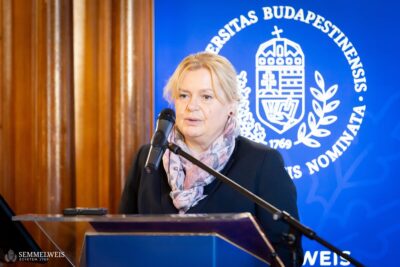 Through its cooperation with the WHO, Semmelweis University is becoming a knowledge center that contributes to solving the global social, economic, and health challenges of healthy aging not only through research and education, but also through policy guidance, emphasized Dr. Judit Bidló, Deputy State Secretary for the Professional Management of Health at the Ministry of Interior.
Through its cooperation with the WHO, Semmelweis University is becoming a knowledge center that contributes to solving the global social, economic, and health challenges of healthy aging not only through research and education, but also through policy guidance, emphasized Dr. Judit Bidló, Deputy State Secretary for the Professional Management of Health at the Ministry of Interior.
The number of people over the age of 60 is expected to increase by 1.4 billion by 2030 and could reach 2.1 billion by 2050. Therefore, healthy aging is not only an individual interest but also a systemic one, the deputy state secretary noted. As she explained, WHO collaborating centers, including the newly appointed one at Semmelweis University, play a key role in ensuring that the joint strategy of the WHO and the EU was well-founded, data-driven, and goal-oriented.
In his speech, Dr. Hans Henri P. Kluge, WHO Regional Director for Europe, highlighted the importance of partnership, innovation, and dignity in addressing the challenges of an aging population. He emphasized that the new center embodied the translation of evidence into action, strengthening people-centered and integrated primary healthcare, which he described as “the cornerstone of healthy aging.” He pointed out that while life expectancy in the WHO European Region currently averaged 76 years, healthy life expectancy still lagged by nearly a decade. The new center will support research, health policy, workforce development, and education to promote healthy and dignified aging. Dr. Hans Henri P. Kluge acknowledged the significant role of Hungary and Semmelweis University in promoting regional cooperation within the WHO. In conclusion, he stated that they were working with strong partnerships and shared commitment to ensure that every additional year of life was spent in health and dignity.
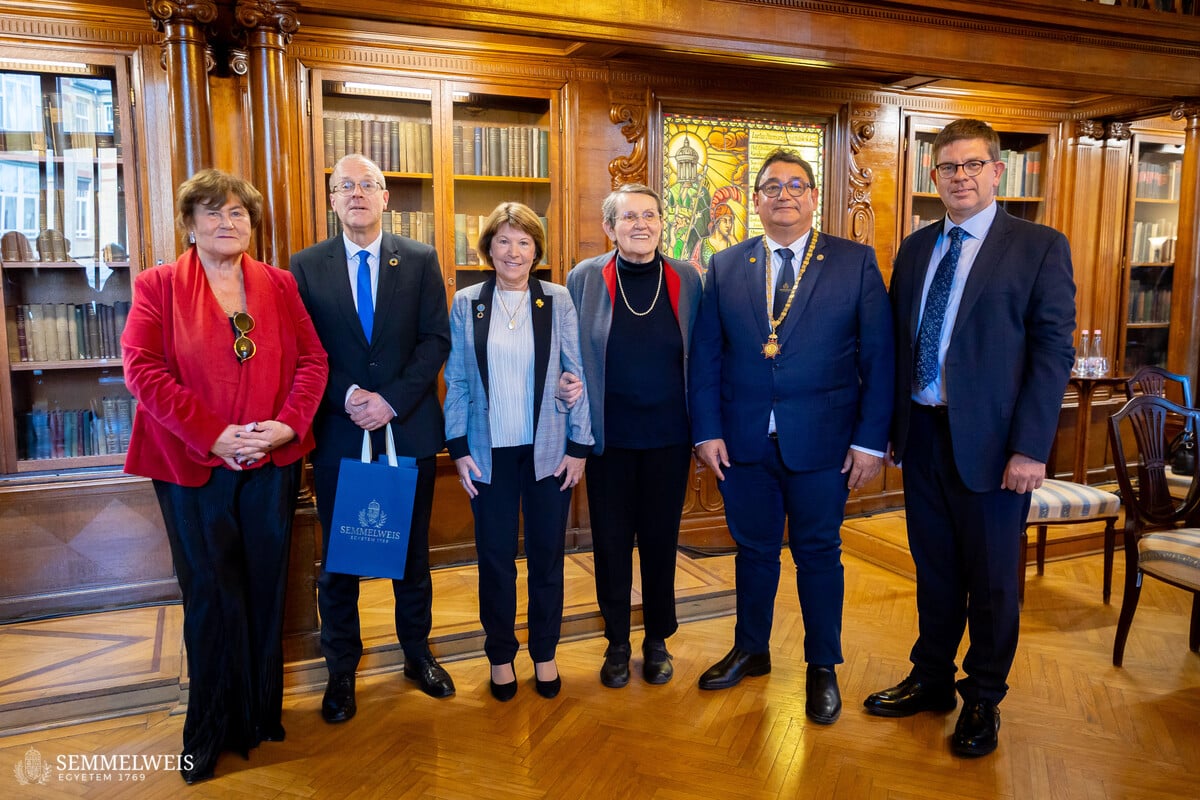
Dr. Zoltán Ungvári, Director of the Institute of Preventive Medicine and Public Health and one of the leaders of the WHO Collaborating Centre, emphasized that one of the greatest public health, social, and economic challenges facing the European Union and Hungary was the unhealthy aging of the population. “Therefore, urgent measures are needed to reduce the morbidity and mortality of age-related preventable diseases. To this end, we must understand and support the conditions for successful aging,” said Dr. Zoltán Ungvári. In his talk, he outlined how the following initiatives contribute to achieving this goal: transforming education with a focus on prevention, including publishing a new public health manual, introducing lifestyle medicine into medical training, and revamping the preventive medicine and public health exam; the university’s practice community model, its Workplace Health Promotion Model Program, and the Semmelweis Study to support preventive aging, and how the reform of primary care in Hungary can benefit from this. The Collaborating Centre will play a key role in knowledge sharing, methodological support, and the coordination of international projects, added Dr. Zoltán Ungvári.
Dr. Róza Ádány, Head of the WHO Collaborating Centre, presented details on how the center would contribute to the development and future implementation of the WHO Europe strategy for healthy aging. The burden of age-related diseases in EU member states was mapped, with a focus on the most common causes of preventable deaths in each member state. Based on the data in the study currently being published, the professor believes that it is worthwhile drawing up targeted intervention plans for individual member states and, in certain regions, coordinated intervention plans for several member states. According to their plans, they will also support the activities of WHO Europe by preparing and organizing relevant policy meetings and intensifying the activities of European WHO collaborating centers related to healthy aging.
Melinda Katalin Kiss, Dr. Balázs Csizmadia
Translation: Judit Szabados-Dőtsch
Photos by Boglárka Zellei – Semmelweis University
